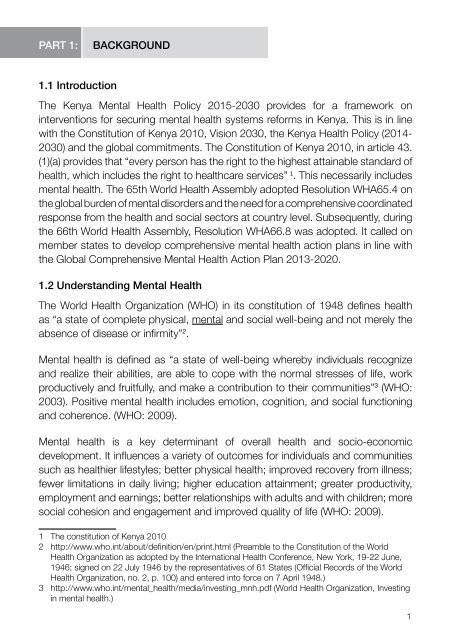KENYA MENTAL HEALTH POLICY
Kenya-Mental-Health-Policy
Kenya-Mental-Health-Policy
You also want an ePaper? Increase the reach of your titles
YUMPU automatically turns print PDFs into web optimized ePapers that Google loves.
PART 1:<br />
BACKGROUND<br />
1.1 Introduction<br />
The Kenya Mental Health Policy 2015-2030 provides for a framework on<br />
interventions for securing mental health systems reforms in Kenya. This is in line<br />
with the Constitution of Kenya 2010, Vision 2030, the Kenya Health Policy (2014-<br />
2030) and the global commitments. The Constitution of Kenya 2010, in article 43.<br />
(1)(a) provides that “every person has the right to the highest attainable standard of<br />
health, which includes the right to healthcare services” 1 . This necessarily includes<br />
mental health. The 65th World Health Assembly adopted Resolution WHA65.4 on<br />
the global burden of mental disorders and the need for a comprehensive coordinated<br />
response from the health and social sectors at country level. Subsequently, during<br />
the 66th World Health Assembly, Resolution WHA66.8 was adopted. It called on<br />
member states to develop comprehensive mental health action plans in line with<br />
the Global Comprehensive Mental Health Action Plan 2013-2020.<br />
1.2 Understanding Mental Health<br />
The World Health Organization (WHO) in its constitution of 1948 defines health<br />
as “a state of complete physical, mental and social well-being and not merely the<br />
absence of disease or infirmity” 2 .<br />
Mental health is defined as “a state of well-being whereby individuals recognize<br />
and realize their abilities, are able to cope with the normal stresses of life, work<br />
productively and fruitfully, and make a contribution to their communities” 3 (WHO:<br />
2003). Positive mental health includes emotion, cognition, and social functioning<br />
and coherence. (WHO: 2009).<br />
Mental health is a key determinant of overall health and socio-economic<br />
development. It influences a variety of outcomes for individuals and communities<br />
such as healthier lifestyles; better physical health; improved recovery from illness;<br />
fewer limitations in daily living; higher education attainment; greater productivity,<br />
employment and earnings; better relationships with adults and with children; more<br />
social cohesion and engagement and improved quality of life (WHO: 2009).<br />
1 The constitution of Kenya 2010<br />
2 http://www.who.int/about/definition/en/print.html (Preamble to the Constitution of the World<br />
Health Organization as adopted by the International Health Conference, New York, 19-22 June,<br />
1946; signed on 22 July 1946 by the representatives of 61 States (Official Records of the World<br />
Health Organization, no. 2, p. 100) and entered into force on 7 April 1948.)<br />
3 http://www.who.int/mental_health/media/investing_mnh.pdf (World Health Organization, Investing<br />
in mental health.)<br />
1


